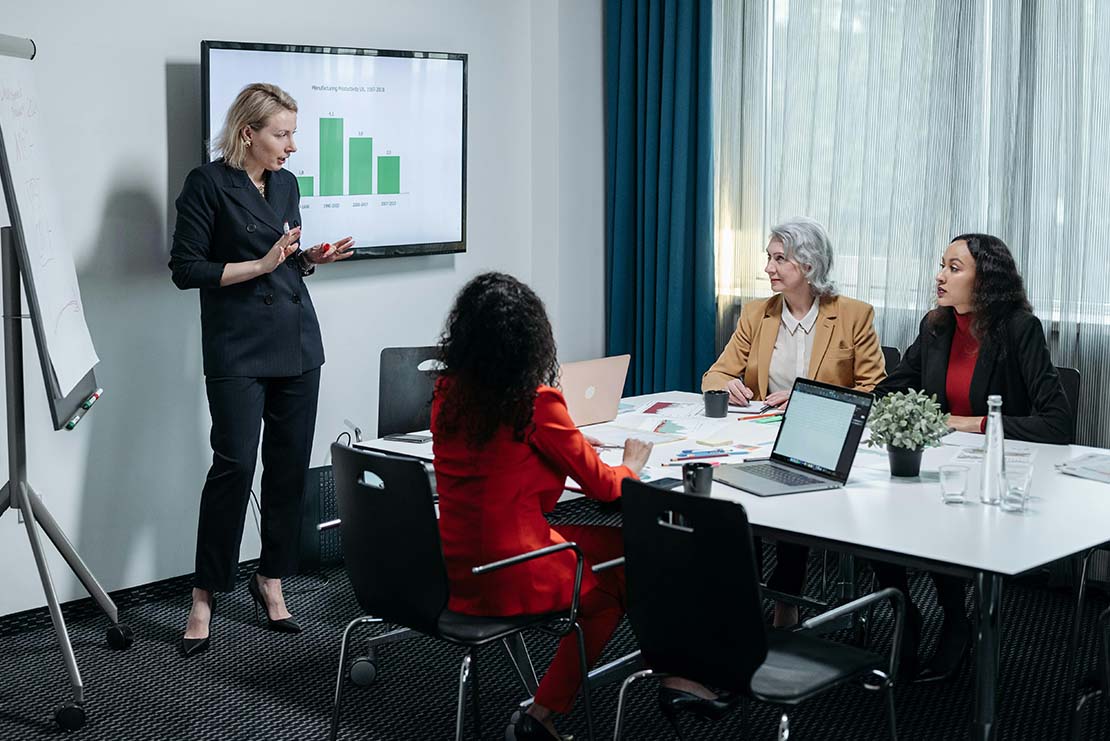Power language for women in business
Power language for women in business
The data is in, and Australia is still lagging when it comes to female representation in business leadership roles.
Fewer than 20% of Australian CEOs are women, and 32.5% of managers, according to Australia’s Workplace Gender and Equality Agency. Entrenched bias aside, what can women do to improve their own chances of becoming CEOs, managers, board directors and other workplace leaders?
That question has multiple answers, but communication style is certainly in the top five. It’s a major theme in our Women in Leadership course and, as with many interpersonal skills, it’s one that can be practised and learned by anyone.
The world’s most influential leaders are known for their strong communication skills. Consider Australian businesswoman Melanie Perkins, CEO and founder of Canva. Perkins is known for her ability to shape crystal-clear and concise messages that can persuade stakeholders. Or former New Zealand Prime Minister Jacinda Ardern, whose communication style has been celebrated for its empathy and connection.
No wonder their technique is analysed the world over.
But back to the challenges faced by your up-and-coming ambitious career woman. Some face overt discrimination, while others are held back by their own gender biases. These include the (mistaken) belief that they must work harder to be recognised, or that they need another qualification first. Others struggle to even acknowledge or promote their achievements, worried they’ll come across as bragging.

With that said, here are the main suggestions that our expert facilitators can confirm will help women to communicate more effectively.
Think big picture
Speak like a leader, not a doer, by skipping the lengthy details when asked for explanations. Focus instead on the future action or outcome. For example, if your manager asks, ‘Is the calendar sync issue fixed?’ they don't want the full technical back-story. You might think you're being thorough, but your manager will think you don't understand how business operates. Instead, speak like a leader: ‘The fix is in progress and will be completed today.’ See the difference?
Stop apologising
‘Sorry I missed your call earlier.’ ‘Sorry if that was unclear.’ ‘Sorry, it’s on page five.’ Can you see a pattern here? It’s the tendency for women to apologise for absolutely everything. While it’s a manner of speech rather than actually being sorry about something, apologising does imply submissiveness. This needs to stop. Same goes for using qualifiers that downplay your authority. For example, don’t say: ‘Just an idea – ,’ or ‘Maybe we should – ,’ when in fact you know exactly what has to be done. Use power language instead, such as ‘I’m convinced we should do this,’ or ‘This is definitely ready.’
Use high-status language
Demonstrate your big picture thinking by using the language of the boardroom, not the workroom. Don’t talk about how many widgets you produced last week. Instead, explain how you boosted productivity or exceeded targets by 10%. Tie any observations back to leadership concepts such as the business strategy, long-term gains or market advantages. Depending on where your career is now, this may require a complete mindset shift. Having mentors will help, and this is one of the topics covered in CCE’s two Women in Leadership workshops.
Know your triggers
As your career progresses, you will find yourself more directly involved in high-stakes situations such as negotiating client fees or project terms. Given the conflicting expectations here, such events are charged with emotion. If you know your jaw clenches or heart rate rises, learn to breathe deeply and count to 10. If you are prone to getting defensive when your idea is dismissed, or the discussions go off tangent, learn to probe the other person for reasons or solutions instead. In short, know your triggers and plan ahead.
Build a team culture
This last tip will take longer to achieve, as it involves shaping a lasting culture that brings out the best in others. Call it power in numbers. When you can set a compelling vision, engage your people and create a positive culture, your team will have your back. They’ll be less likely to agitate behind your back. Former German Chancellor Angela Merkel was famous for tirelessly building rapport behind the scenes, even among her harshest critics. This helped to cement her stance and allowed her to maintain a calm and composed communication style.
Women in Leadership is one of our most popular courses here at CCE – so popular in fact, the content is split across two full-day sessions. The Foundation Skills workshop sets out the broad areas to focus on. The Advanced course focuses more on influencing other decision-makers.
By equipping women with more effective communication skills, here’s looking at continued growth in female leadership across Australia.
Featured courses
Improve your leadership skills, addressing challenges unique to women in leadership and leveraging your unique attributes.
Learn moreLearn to lead with impact and confidence, and review your assumptions about what it takes to succeed as a female leader.
Learn more